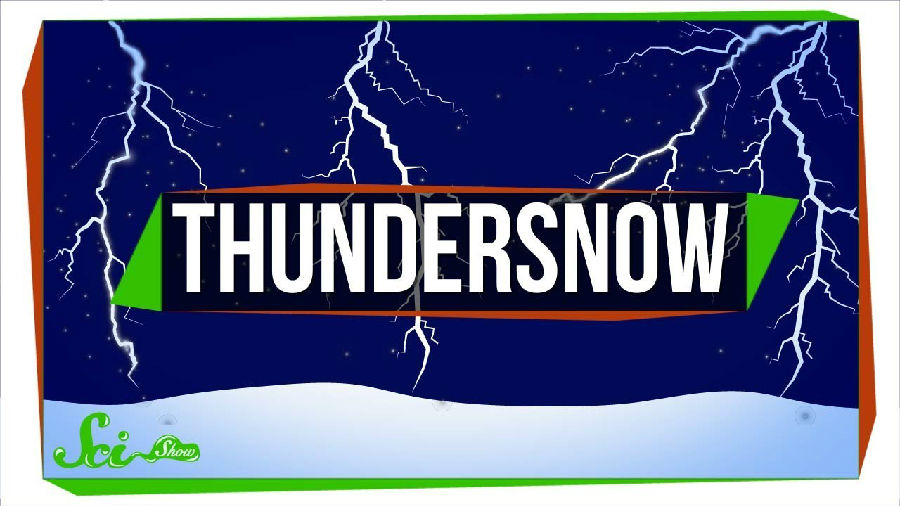SciShow is supported by Brilliant.org.
本期科学秀由Brilliant.org赞助播出。
If you imagine a blizzard, you probably picture lots of snow, bitter cold, wind biting at your nose and ears...
如果让你想象一场暴风雪,你或许会想到大雪、寒冷以及冻鼻子冻耳朵的寒风...
But one thing you probably do not imagine is thunder. Thunder is usually reserved for summer rainstorms, instead.
但有件事你或许想象不到,即雷。雷通常出现在夏季的暴雨之中。
But every once in a while, thunder shows up in what seems like the wrong season -- and when it does, it can be kind of terrifying.
但有时雷也会出现在似乎错误的季节—当雷出现时,还是有些恐怖的。
It's known as thundersnow, and it's one of the coolest rare quirks of weather.
这被称为雷雪,是气象最寒冷稀有的怪异现象之一。
It's easy to think of winter snowstorms and summer rainstorms as pretty much the same thing,
很容易就想到冬季雷雪和夏季暴雨是几乎相同的事物,
it's just at different temperatures and with different kinds of precipitation. But there's more to it than that.
只是出现的气温不同,降落物也不同。但还远远不止这些。
Before your classic summer storm, sunlight warms the ground and makes the air at ground level warmer than the air a couple kilometers above it.
在开始典型的夏季风暴之前,日光温暖大地并使得地面空气比几千米以上的空气温度更高。
But before winter storms, the ground is already pretty cold, and the more indirect sunlight doesn't warm it very much.
但在冬季风暴之前,地面温度已经相当寒冷了,更多的日光直射也无法温暖地面。
So there aren't the same sorts of big temperature differences between layers in the atmosphere that there are in the summer.
因此大气之中两层间的温差和在夏季之中并不一样。
That might not sound like a big deal, but it makes all the difference in the world, for both the type of storm and whether there's thunder.
这听起来不是什么大事,但这却导致了所有的不同,不论是风暴类型还是有雷鸣与否。
To understand why, it helps to know how summer thunderstorms happen in the first place.
要理解其中奥秘,就要首先了解夏季雷雨是如何产生的。
See, warm air can hold more moisture than cold air, so in the summer, water in the environment tends to evaporate into the heated air near the ground.
热空气比冷空气更能锁住水分,所以在夏季,环境中的水分会蒸发成地面附近的加热空气。
That's part of why it feels so sticky and humid outside right before a summer storm.
这就是为什么在夏季风暴前会感到户外粘稠湿润的部分原因。
Then, those pockets of warm, wet air quickly rise into the cooler layers above them.
之后这些温暖且湿润空气的气囊迅速上升至上方的寒冷层。
And ultimately, the water condenses into these tall, dark storm clouds.
最终,水分压缩成了这些长长的黑色暴风云。
Those jostling air pockets also generate lots of wind -- another familiar sign of an impending thunderstorm.
那些推挤的空气囊同样也会形成大风—另一种雷雨即将临近的常见迹象。
The wind whips up the water droplets, and ice crystals, and dust in the atmosphere.
风激起了大气中的水滴、冰晶以及灰尘。
And as those different materials rub against each other, electric charge gets separated,
当那些不同物质相互摩擦时,电荷就被分散了,
with one part of the cloud becoming more positively charged and the other more negative.
云层中的一部分将携带更多正电荷,而另一部分则有更多负电荷。

This is known as the triboelectric effect, and it's the same reason you sometimes get zapped by static electricity.
这被称为摩擦起电效应,你有时会被静电击中也是同理。
Eventually, the charges in the cloud get so out-of-balance that a lightning bolt streaks across the sky to even things out.
最终,云中的电荷变得极其不平衡,闪电球则会划过天空将地表事物夷为平地。
That lightning super-heats a column of air, which expands as it's heated and then contracts back together after the bolt is finished.
闪电过度加热空气柱,随着加热,空气柱膨胀,然后在闪电球结束后缩回原状。
And that vibration of the air, finally, gives you thunder. It's a pretty specific series of events.
最终,空气的那种振动会形成雷。这是事件种相当特别的一系列。
You need warm, moist air rising through turbulent winds into cooler, drier air.
你需要温暖湿润的空气上升穿过湍流风形成更加寒冷干燥的空气。
And then, that needs to generate the electric charge imbalances that lead to lightning and thunder.
然后需要产生电荷不平衡,这样才能形成闪电和雷。
This happens all the time in the summer, but it usually doesn't happen in the winter. Because winter storms tend to fail at the first step in this process.
这种情况在夏季常发生,但在冬季并不常见。因为冬季风暴在第一个步骤这种就会失败。
Since the ground generally stays pretty cold in the winter, the air above it stays cold and dry.
因为冬季地面通常相当寒冷,而地面以上的空气也是寒冷干燥。
So any rising moisture tends to condense pretty uniformly throughout the sky instead of all in one place.
所以任何上升湿度穿过天空时都易于相当统一的被压缩。
Instead of the tall, dark, and handsome clouds that precede a summer storm, you get shorter, grayer, gloomier ones that cover the whole sky.
相较于夏季长长的暗色乌云,冬季则会出现更短颜色灰灰的且更加阴暗的云层。
And instead of electric charge building up, the charge is dispersed or hardly separated at all. So things tend to stay pretty quiet.
相对于形成电荷,电荷会被分散或完全不会被隔开。所以一切似乎相当安静。
But under just the right conditions, there still can be thunder during a winter snowstorm -- or thundersnow, to be exact.
但在适当条件下,冬季雪暴—准确的说应该是雷雪,中仍会出现雷。
It sometimes happens near lakes or other large bodies of water where the water warms the air right above it just like the ground does in the summer.
有时会发生在湖泊或是大片水域附近—这样湖水可以温暖上方空气,就像夏季的地面一样。
Thundersnow can also happen during a powerful nor'easter -- a kind of storm along the Eastern Coast of the U.S.
雷雪也会发生在东北风暴中—美国东部沿海的一种风暴。
These tend to have strong winds that churn the atmosphere and can separate enough electric charge for lightning even in the winter.
在这些情况中大风会搅动大气并分离充足的电荷,为冬季闪电做准备。
Thundersnow can be pretty alarming when it happens, because we're so used to blizzards just silently raging while we huddle at home with tea or hot chocolate.
出现雷雪时应该相当警惕,因为我们习惯于窝在家里喝着茶或热可可,看着窗外暴风雪安静的汹涌。
Still, it's definitely cool, and it gets meteorologists pretty excited -- there are even some viral videos to prove it.
这样绝对很酷,还会让气象学家们相当兴奋—还有很多视频能够证明。
But even though we know the kinds of conditions that can cause thundersnow, scientists still don't quite know how common it actually is.
但是虽然我们知道有很多情况都会引起雷雪,科学家们还是不知道雷雪的普遍程度。
So they're working on strategies to better figure it out.
所以他们还在为此奋斗。
Recently, scientists have found that, if winter lightning is likely,
最近,科学家们发现,如果冬季闪电有可能的话,
the ice crystals in a cloud will all get tilted in a certain way by the electric forces in an impending strike.
云层中所有的冰晶将通过击打中的电荷并以某种方式变得倾斜。
That means radar will bounce off the clouds in the same way, which could help scientists track and predict thundersnow.
那就意味着雷达也可以以同一种方式弹开云层,这就能够帮助科学家们追踪并预测雷雪。
So this winter, they've been looking carefully at weather patterns, radar,
所以这个冬季,他们一直在仔细寻找天气模式、雷达
and even reports on Twitter to help us understand if thundersnow is coming to a blizzard near you.
甚至是推特上的报道,希望能够帮助我们了解雷雪是否马上来袭。


